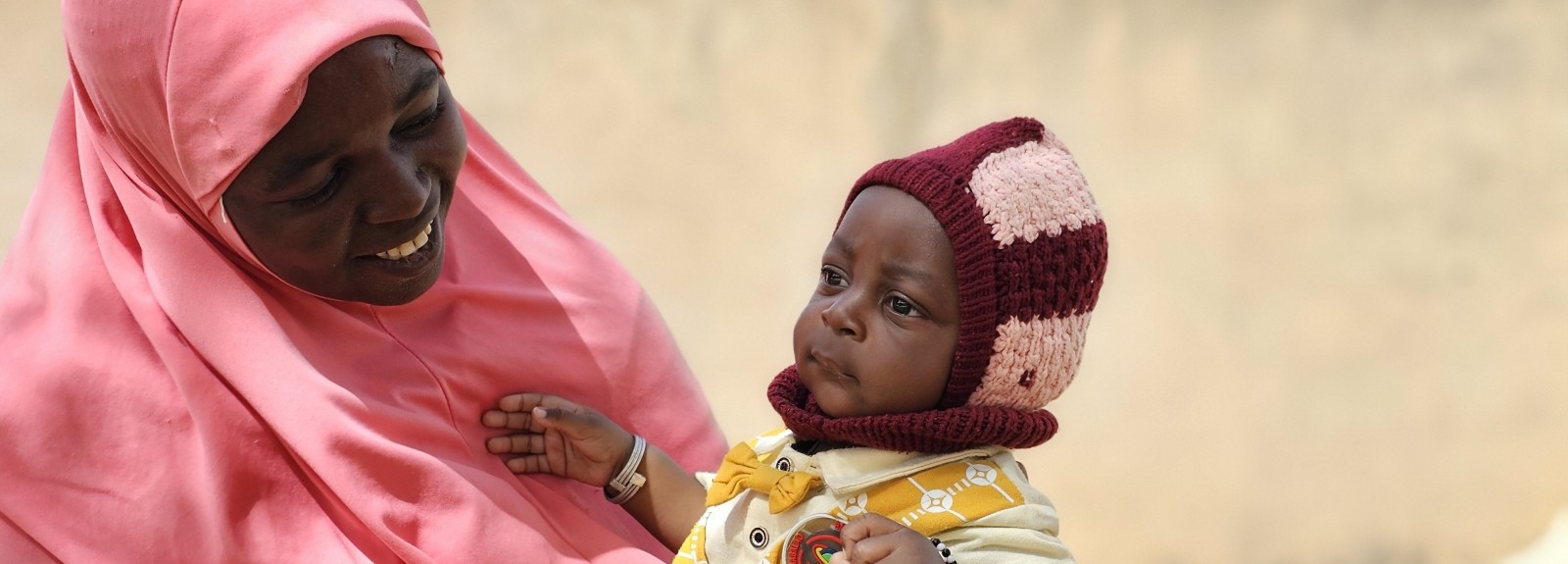Bassira Kadadey, a 25-year-old mother of three from Korkorey village in the Dosso region of Niger, is a force to be reckoned with. While her husband Oumarou’s work often keeps him far from home in Ghana, Bassira not only raises her seven-year-old son Adboul, four-year-old daughter Nana, and six-month-old baby Mohammed, she also helps support her family through her job as a community health worker—or relay, as it is commonly known.
Bassira Kadadey at her home in Korkorey
“Before this relay job, I always asked my family for help. But now I do everything for myself thanks to the income I earn,” said Bassira. “I’m the one who takes care of many of my family’s expenses: buying ingredients for meal preparation and clothes for myself and my children.”
Due to water scarcity in Korkorey, women often have to get water from a local well. Sometimes, Bassira spends an entire morning waiting to fill up her containers.
Through MOMENTUM Integrated Health Resilience, funded by the U.S. Agency for International Development (USAID) and led by Corus organization IMA World Health, Bassira received training in the Care Group model. This community-based approach brings together a volunteer network of 10-15 mothers who promote beneficial health and lifestyle practices such as family planning, prenatal and postnatal care, assisted child delivery, exclusive breastfeeding, proper hygiene, home gardening, and food preparation techniques for a diversified, nutritional diet.
Bassira conducts a nutrition awareness-raising session with her Care Group members in Korkorey.
“MOMENTUM helped us set up the Care Group in our village, and I was chosen by the community to be the lead mother because I can read and write, and I’m sociable,” said Bassira. “I learned about integrated child care as well as how to facilitate a focus group and make a home visit during 14 days of training. I also took part in an mHealth [i.e., mobile health] training course at the Korey Mai Ruwa Integrated Health Center for 5 days.”
As the lead mother of her Care Group, Bassira facilitates nutrition awareness sessions for pregnant and breastfeeding women. She also treats children for malaria, diarrhea, and pneumonia. “We’ve noticed that this year the number of illnesses in our village has dropped considerably,” Bassira pointed out.
Bassira uses an mHealth app to input a sick patient’s symptoms and health status. This information then links to the national health database so that it can be tracked and updated over time.
In Niger, MOMENTUM works with mothers to help them develop knowledge about their own health and the health of their children and families through social and behavior change (SBC) activities. Moreover, in the three districts where MOMENTUM implements Care Groups, the project has trained more than 1,300 lead mothers, providing instruction on using teaching tools such as image boxes, tracking primary health data in notebooks, and working with reporting tools. The training also includes guidance on how to screen for acute malnutrition using mid-upper arm circumference tape.
Bassira confers with members of her Care Group.
“The SBC sessions on best practices in nutritional health and hygiene led by these mothers have significantly transformed their lives. Their ability to cope with illnesses and other health concerns has significantly improved,” said Assalih Gousmane, a MOMENTUM Nutrition Officer who conducts regular follow-up visits with Bassira to check on her work and provide additional assistance if needed.
During a supervision meeting, Bassira discusses guidance on child care with Assalih Gousmane, a MOMENTUM Nutrition Officer.
This year, MOMENTUM also plans to help local mothers create 500 home gardens by equipping them with materials such as hoes, rakes, watering cans, and seedlings in order to promote the production and consumption of local vegetables with high nutritional value.
Lead mother Bassira with her Care Group following a training session
Back at home, Bassira practices what she teaches. As she explains, “Today I practice exclusive breastfeeding with my son Mohammed. Before, it was unthinkable because of false rumors about breastfeeding. Now that I’ve tried it, I’ve noticed for myself that Mohammed is healthier. … He rarely gets sick except for simple colds, and he is stronger and more active than Adboul and Nana when they were his age.”
Bassira at home with her children Adboul, Nana, and Mohammed
With her training, Bassira can often treat her children for illnesses at home, but she also recognizes the importance of health facilities and advocates for their use. “If I don’t have the medicine, I take them to the health center for treatment. … At the health center, they have medicines and equipment to better manage illnesses. If you want to find out more about your health problem, you need to go to a health center.”
Bath time for baby Mohammed
As for what lies ahead, Bassira is very optimistic. “I think that, in the future, health [in our village] will improve significantly because we are trained in good health practices.”
Bassira and her son Mohammed
All photos by Hadjara Laouali Balla, Knowledge Management/Communications Advisor, MOMENTUM Integrated Health Resilience/Niger.

